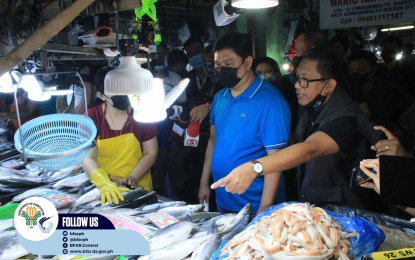
IMPORTED FROZEN FISH. Officials of the Bureau of Fisheries and Aquatic Resources (BFAR) visit Commonwealth Market in Quezon City for their information campaign on Thursday (Nov. 24, 2022). Their campaign intends to educate vendors on the policies for imported frozen fish. (Photo courtesy of DA-BFAR)
MANILA – The Bureau of Fisheries and Aquatic Resources (BFAR) cautioned traders against the selling of unauthorized imported fish in wet markets amid the closed fishing season.
BFAR made the warning as its officers and personnel visited the Commonwealth market in Quezon City Thursday and discovered that imported fish like salmon, pampano and squids are being sold.
BFA officer-in-charge Demosthenes Escoto said the inspection was part of the agency’s information campaign that will ensure the welfare of local fishers in the country while there is a fishing ban.
“As the government allows fish importation anew in order to fill in the supply gap while our conservation measures are in place and keep the prices of our fish commodities in the retail markets stable, the DA-BFAR conducts this IEC (information, education, and communication) Campaign that will help safeguard the livelihood of our local fishers and prevent competition between our local and imported fish products,” Escoto said.
He was referring to the approval of the importation of frozen fish commodities that are authorized for “canning, processing, and institutional buying.”
He added that the BFAR’s campaign dubbed as “Imported na isda sa merkado, pwede kapag otorisado” (Imported fish in the market, allowed when authorized) intends to help vendors understand and exercise the existing policies.
“Only fish imported through Fisheries Administrative Order (FAO) 259 and the recent CNI (Certificate of Necessity to Import), which gives priority to municipal fishing associations/cooperatives and commercial fishing operators affected by the closed fishing season, are allowed to be sold in the wet markets,” the BFAR official said.
Besides this, the agency is also expecting vendors to help in preventing the unauthorized diversion of imported frozen fish into the market.
“[The IEC aims] to encourage them not to sell imported fish products intended for canning, processing, and institutional buyers, and help prevent, at their level, the illegal diversion of these products that are unauthorized for wet markets,” he added.
As of now, the BFAR is targeting to visit 21 wet markets in the National Capital Region.
Last Nov. 10, the Department of Agriculture announced the approval of the importation of 25,000 tons of frozen fish, including round scad, bigeye scad, mackerel, bonito and moonfish. (PNA)
